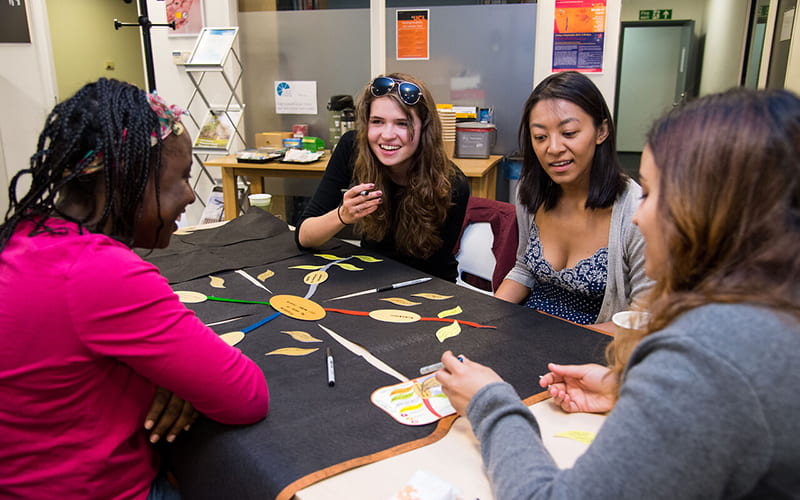
UCL ChangeMakers workshop
8 June 2020
By Omar Hallab, Social Sciences BSc
As someone who has been able to harness the power of conducting research at undergraduate level both inside the classroom through opportunities within my department and later outside university in the professional sphere, I am here to share with you the benefits I have gained.
1. Building confidence
As a BSc Social Sciences student, I have been rigorously trained in both quantitative and qualitative methodology. Whatever UCL degree you are undertaking, you are likely to get exposed to research methodology in your field, especially through our Connected Curriculum ‘which aims to ensure that all UCL students are able to learn through participating in research and enquiry at all levels of their programme of study.’
The first time I witnessed real-life impacts of research at university was through a UCL ChangeMakers project – a Social Sciences Consultancy lead by Dr Katie Quy. ChangeMakers funds departmental projects allowing ‘students and staff to work together in partnership to bring about improvements to the student learning experience at UCL.’ Our project consisted of collecting data from students to improve both their learning experience and student-staff relations. We designed a survey for students on our programme in order to gain insights into four key domains: demographics, module development, careers and administration. We then followed up by conducting focus groups. As a team, we analysed the data and synthesised findings in a report which we presented to our department at the end of the project. The department was very pleased with our work, and we have already starting witnessing fundamental changes in our educational experiences. For instance, the department has already developed new politics modules, and the Careers Service now specifically targets jobs for our degree.
The project felt very special since it was conducted by students, for students. I have been able to draw on and develop the methodology skills I acquired and I also got the chance to improve my writing and oral communication skills. Being part of this team exposed me to teamwork and constructive feedback and has allowed me to grow in confidence.
2. Career opportunities
My advice to current students is to definitely think about undertaking work experience during your studies. UCL has a plethora of resources to support you in sourcing meaningful, relevant internships that can help you work towards your future career. A lot of these opportunities are research-based, so do engage with UCL Careers!
In my second year I started seeking summer internships in the field of social research through which I could build on the skills I had been developing. I attended UCL Careers’ training sessions, which provide invaluable support on building your CV, writing your Cover Letter, finding internships and even editing your LinkedIn page. I decided to apply for an internship at Ipsos Mori and eventually received the position.
At Ipsos Mori, I worked as a Public Affairs/Market Research Intern in the Social Research Institute, with a focus on delivering large-scale evaluation projects for clients including the Home Office, Ministry of Housing, Communities and Local Government, Department of Transport and the European Investment Bank. I gained exposure to diverse projects, each expanding on my capabilities as a researcher. I had the opportunity to work on topics I was passionate about – from roads reform and community cohesion, to investment finance and trade policy post-Brexit. I was encouraged to design my own timetable, and think rationally about how to distribute my time across the different projects. This internship was fundamental in shaping my professional character. I learned to be flexible, work well under time pressure, pay attention to detail and remain organised. I was able to undertake training sessions that directly fed into the skills needed to complete the evaluation projects. One of my favourite aspects of the internship was the intellectual and critical skills it required me to draw on. I was asked to think about ‘the story behind the data’, and engage with ‘the ‘bigger picture’. I believe this approach has now streamed into other aspects in my life, whether it is in completing data collection for my dissertation or reading an article in The Economist. I also gained a sense of the kind of jobs I should be aiming for in the future.
3. Considering further study
Undertaking research experience at university can be a great way to build on your knowledge, and navigate your position in the world of academia. My advice is to go ahead and email your favourite professors whose research you are passionate about to ask about future opportunities – many staff are keen on and encourage student-staff collaborations.
Many departments and research centres here at UCL are on the look-out for current students to help on research projects that are relevant to the topics they study. During the summer of 2019, I volunteered as a part-time Research Assistant with the Department of Social Science. Led by Dr Rachel Rosen and Dr Veena Meetoo, the opportunity consisted of a mixed-method evaluation of a local authority (LA) project for unaccompanied asylum-seeking children (UASC). We critically evaluated the literature on community cohesion and integration in the context of UASC in the UK, and worked on developing a theoretical framework through which we could analyse the data collected – answering the question ‘What values do the concepts of “integration” and “community cohesion” bring in relation to UASC’s wellbeing.’
As someone who is passionate about the topic of migration, this was a great opportunity to understand the mechanisms through which knowledge is generated in the field and learn directly from leading scholars. Intellectually, it challenged me to build a theoretical framework, an opportunity that made me strongly reflect about whether I want to study a master’s related to politics and migration.
Finally…
My final piece of reflection is this: Research can be an inward-looking task. Through research, you will find yourself reflecting on your passions, your contributions to the world and what kind of jobs you would like to do in the future. You will discover a lot about yourself through the process, and hopefully, you will be grateful for the person you have become through your work.

 Close
Close







